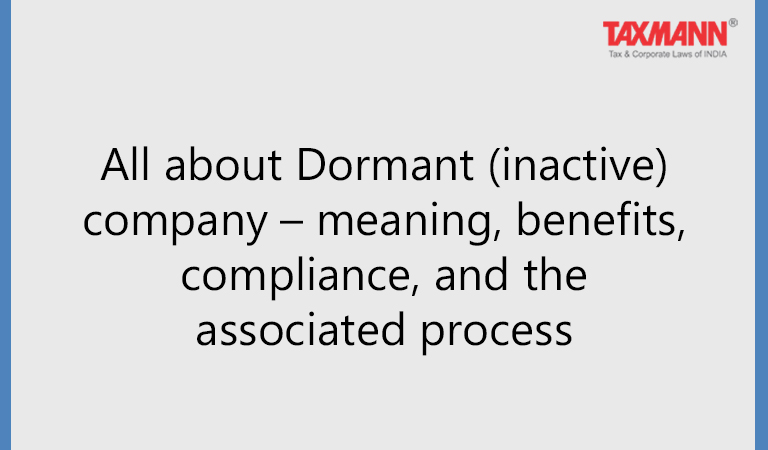All-about Dormant (inactive) Company – Meaning, Benefits, Compliance, and the Associated Process
- Blog|News|Company Law|
- 2 Min Read
- By Taxmann
- |
- Last Updated on 8 June, 2022

[2021] 129 taxmann.com 354 (Article)
Dormant company (inactive company)
1. Dormant company is a new concept introduced in the Companies Act 2013 which was not there in the earlier Act of 1956. However, the concept is there in the United Kingdom under English Law. Section 455 of the Companies Act 2013 spells out about the dormant company. According to this section, the Dormant Company means inactive or inoperative company.
Explanation of Dormant Company
1.1 Explanation provided to this section says that for the purpose of this section “inactive company: means a company which has not been carrying on any business or operation or has not made any significant accounting transaction during the last two financial years, or has not filed financial statement and annual returns during the last two financial years.
1.2 Meaning of significant accounting transaction
In the explanation provided by the Act, it says not made any “significant accounting transaction”. Let us understand as to what is the meaning of significant accounting transactions.
Significant accounting transaction simply means that the company has not been doing any other transactions than (i) making payment or fees to the Registrar of Companies; (ii) making payment in order to fulfill the regulatory requirements; (iii) making allotment of shares and (iv) effecting payments for the purpose of maintenance of office and records.
Benefits of Dormant Company
2. The question that arises in the minds of the reads is to – why would anyone create a company and register it to declare it dormant? The main purpose of acquiring or maintaining a company’s outstanding position is to enable the company to maintain its corporate status even if it does not do any business. We can look at the benefits derived from the status of a dormant company as summarized below, to answer the above question.
Click Here to Read the Full Article
Disclaimer: The content/information published on the website is only for general information of the user and shall not be construed as legal advice. While the Taxmann has exercised reasonable efforts to ensure the veracity of information/content published, Taxmann shall be under no liability in any manner whatsoever for incorrect information, if any.

Taxmann Publications has a dedicated in-house Research & Editorial Team. This team consists of a team of Chartered Accountants, Company Secretaries, and Lawyers. This team works under the guidance and supervision of editor-in-chief Mr Rakesh Bhargava.
The Research and Editorial Team is responsible for developing reliable and accurate content for the readers. The team follows the six-sigma approach to achieve the benchmark of zero error in its publications and research platforms. The team ensures that the following publication guidelines are thoroughly followed while developing the content:
- The statutory material is obtained only from the authorized and reliable sources
- All the latest developments in the judicial and legislative fields are covered
- Prepare the analytical write-ups on current, controversial, and important issues to help the readers to understand the concept and its implications
- Every content published by Taxmann is complete, accurate and lucid
- All evidence-based statements are supported with proper reference to Section, Circular No., Notification No. or citations
- The golden rules of grammar, style and consistency are thoroughly followed
- Font and size that’s easy to read and remain consistent across all imprint and digital publications are applied



 CA | CS | CMA
CA | CS | CMA
